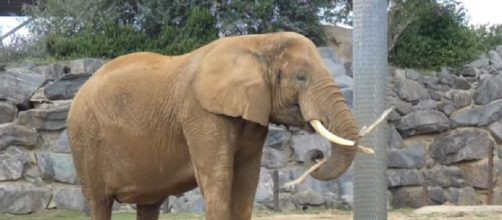The first of the elephants came to Britain in 1255 under King Henry III. There are plans to ban keeping them in zoos or safari parks because they have mental illnesses while in captivity. In the opinion of campaigners, the intelligence levels of elephants are high. They suffer when they are kept captive. UK Environment Minister Zac Goldsmith would introduce the legislation. Under the provisions of this legislation, there will be a ban on introducing new elephants into existing locked-up populations.
News AU says at present, and there are 51 of them scattered across many zoos in the country.
They used to be a major attraction in circuses, but since January 2020, there are restrictions. Circuses cannot hold them for entertainment. The RSPCA says the pachyderms face different illnesses when they lose their freedom of movement and have to remain in captivity. In fact, their average lifespan drops to 17 years when in zoos and safari parks. Their counterparts in the wild can live up to 50 years. A herd of elephants is set to travel from a zoo in Britain to the wilds of Kenya.
Elephants lose freedom of movement when in captivity
The subject of the welfare of elephants came to the forefront after the story of Kaavan, the "world's loneliest elephant," came out. This animal was a part of a zoo in Pakistan and moved to a sanctuary in Cambodia.
The conditions he lived in became the focus of a campaign by Four Paws International animal rights activists in 2016. Finally, the relocation of Kaavan happened from Islamabad Zoo to a facility in Cambodia. News AU goes on to add there are space limitations for large animals like elephants. In Britain, the enclosures appear to be too small. Lorraine Platt is chairman of the Conservative Animal Welfare Foundation. She says: "It isn't appropriate to keep elephants in zoos. They need to have large spaces in which to roam, and also they have close-knit family groups as well." Animal Welfare Minister Lord Goldsmith agrees. He explains elephants are iconic, thoughtful, and highly intelligent animals.
They must enjoy appropriate environments where such trends exist.
Ban on captive elephants in Britain on the cards
According to Sky News, animal rights campaigners are worried about the impact on captive elephants' physical and mental health. The British government has taken note of this and could impose a ban on keeping elephants in captivity. It has asked the Elephant Welfare Group to come up with guidelines based on evidence. The intention is to improve the management and welfare of elephants in Britain and bring the curtains down on the practice that has gone on for seven centuries. Will Travers is the president of the Born Free Foundation. He says: "There's a lot of evidence over the years that's been gathered about issues to do with longevity, physical ailments, psychological ailments, and very low breeding rates for calvesmeageres on to add that the number of elephants in captivity in Europe is aging.
Somewhere down the line, there could be a situation where they would self-extinguish.
Elephants are huge animals, and they need more space
Sky News says there are a limited number of elephants in captivity across the zoos in Britain. They are removed from their natural environment and are out of sync with their social setting. Moreover, they suffer from ailments that are not just physical but also psychological. Will Travers feels there would be a gradual phasing out to implement any ban. The existing elephants could go back to the wild. Alternatively, there would be no fresh induction. He suggests a sufficiently large European elephant sanctuary of significant size. That would provide them with a choice to be in the company of other elephants.


